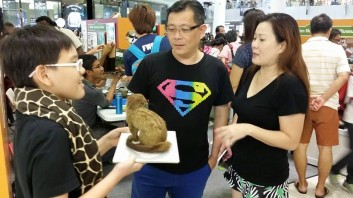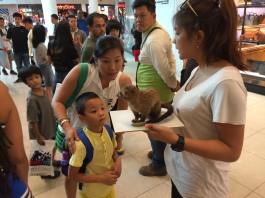By Claudia Ang
“It’s better to drink milo,” said one of the children I was speaking to suddenly. I looked at him, bemused and yet intrigued because he had a straight face on, while the other children giggled and their parents laughed in view of his innocence and curt honesty.
He meant every word he said.
(Photos by: Claudia Ang, Festival of Biodiversity Singapore)
We were at the Festival of Biodiversity held at Vivo City earlier in June 2015. I was just speaking to the children about our native civets when we came to the topic of Kopi Luwak. The story of the civets’ captivity and exploitation as a result of the Kopi Luwak trade caused their faces to twist in grimace. Their eyebrows furrowed, in sadness and in anger, and perhaps also in the inability to comprehend how or why us humans could allow such unnecessary abuse to occur just in exchange for some coffee beans. In that instant I knew that through our brief encounter they already had within them an appreciation for the creatures, for their beauty and sheer existence.
That’s when he said it. “It’s better to drink milo.” I looked at him expectantly, urging him to continue explaining his point of view to the other children. “Milo is good and it gives us energy too. It’s also sweet and chocolatey, not like coffee. We shouldn’t use the civets in this way. No matter how good it tastes, it’s not right.”
I gave him a badge with a picture of the common palm civet, shook his hand, and said, “Now will you please do me and the civets a favour? Share this story to all your friends, your family, and everyone who doesn’t know about it yet. Help us help the civets, okay?” He nodded, thanked me for the badge, and went away with his parents.
I was brimming inside. Getting the message across to as many people as we can has always been the goal, but it’s conversations like these that always brighten up my day, when I’m offered another point of view or alternative that helps us look at the entire issue in a separate person’s shoes. Children see it that way – they see no need for the abuse or the exploitation or the coffee beans itself. There are so many other drinks and types of great coffee that do not require the sacrifice of lives in order to produce.
It brought me back to the event we had two weeks earlier at Pulau Ubin in celebration of Ubin Day. People were horrified to learn about the living conditions of Kopi Luwak civets, and yet were able to readily admit that they have tried the coffee before. There’s no difference, they say. It’s just a marketing tool to get more money.
I will never know what real Kopi Luwak tastes like, because I’m sure I will never try it. But the point is, why waste all that money on these “exquisite” produce when you can get real, good, alternative produce at a lower cost?


Hi Claudia,
I understand you are doing this with ethical mind set and aim at sustainability. But how about all the thousands of local Indonesian farmers who get payed a premiums for this special kind of coffee? And I am not talking about caged Kopi Luwak sourcing but Wild foraged Kopi Luwak from Gayo, Sumatra Indonesia. These farmers (1000+) all forage wild Kopi Luwak coffee on their plantations in the morning and I would like to show you this process. Kopi Luwak is something special that has been here for over 300 years, please let us encourage Wild sourcing instead of banning and neglecting Kopi Luwak by saying it’s all bad. Please help preserve Indonesian culture.
Kind regards,
Justin Tieleman
Dear Justin,
Thank you for your comment and for bringing Wild Gayo Kopi Luwak to our attention. We have always been aware that there are ethical companies such as yours that do not harvest the coffee beans from captive civets. However, due to the lack of certification and the ease of wrongful advertising, many farms that produce the coffee from captive civets still do sell them as “Wild-sourced” instead. This is a disturbing phenomenon.
We are glad, though, that a standalone certification is under way (please read: https://projectluwaksg.wordpress.com/2014/04/19/certification-the-next-big-thing-for-the-kopi-luwak-industry/ ) and we hope that through this, there will be a clearer and more definite distinction between caged-sourced and wild-sourced Kopi Luwak. Knowing that there is a universalized and standard certification as such will aid in putting the consumers’ minds at ease, that they are making correct and informed decisions that involve appreciation of a country’s culture – without using the lives of the civets as a means to an end.
Once again, thank you for writing to us. We are looking forward to share the good news of the certification, once it has been approved, with our readers.
Best regards,
Claudia